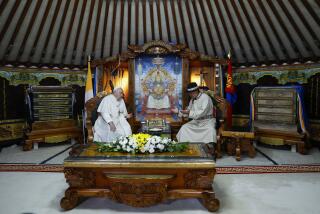From Conqueror to Peacekeeper
- Share via
ULAN BATOR, Mongolia — When Mongol troops entered Iraq in 1258, a grandson of Genghis Khan sacked Baghdad in a four-day siege so bloody that legend has it the rivers ran red for days. Eight centuries later, they’re back, and they want to help.
“We’re on your side,” Mongolian President Natsagiin Bagabandi quipped to President Bush in April in Washington, a Western diplomat said. “We’ve had problems with Iraq ourselves.”
The country that was home to the fierce Mongol hordes who descended from Central Asia’s frigid steppes to slay every man, woman and child in any city that refused to submit has transformed itself into an international peacekeeper. Since 1999, Mongolia has dispatched former special forces troopsto Western Sahara, Congo, Afghanistan and, as of September, Iraq.
On Tuesday, U.S. Air Force Gen. Richard B. Myers, chairman of the Joint Chiefs of Staff, reviewed the soldiers, arrayed here in 7-below-zero weather, who this month will begin replacing the 173 Mongolians in Iraq.
“Now Mongolian soldiers will have experience in international peacekeeping and will be able to exchange information with soldiers from other countries,” said Maj. Gen. M. Bombatar, vice chief of staff for Mongolian forces, wearing a Soviet-style dark-green uniform with red, green and gold epaulets.
“Just a few years ago, no one could imagine Mongolian soldiers performing in peacekeeping with U.S. soldiers,” he said. “But now it’s a normal event. That is proof of our progress.”
The Mongolian armed forces are not your father’s military. They’re more like your grandfather’s. The troops’ training includes horsemanship, archery and wrestling. Their tanks, older than those used by Iraq in the war, are museum pieces in more developed nations.
All 19 of the artillery pieces the Mongolians planned to take to Iraq needed repairs. The troops there lack much of the protective gear their American counterparts have, and they are armed with Soviet AK-47 rifles from the 1960s and ‘70s.
Yet the most powerful nation in the world considers its tiny ally important enough to merit a thank-you stop on Myers’ nine-day tour this week, along with Japan, Australia and China. Myers is the first Joint Chiefs chairman to visit Mongolia.
“It’s important for the community of nations to be part of this effort,” he told reporters. “If all nations worked hard against this threat of terrorism, there wouldn’t be any terrorism.”
The Iraq mission is the most ambitious to date for the sparsely populated and poor nation.
For Mongolia, which began democratic reforms in 1990, the reconstruction and peacekeeping missions bring international prestige and acceptance. And when the missions are carried out under the auspices of the United Nations, they pay. The U.S.-led coalition is not paying for contributions in Iraq, but Washington is giving $1 million to Mongolia’s new peacekeeping training center.
Every bit counts in a nation where per capita income averages $400 a year. Mongolia spends about $20 million a year on its 15,000-member defense force -- enough to cover a day’s lunch for the U.S. military, whose 2004 budget is nearly $400 billion.
Two-thirds of Mongolia’s 2.7 million residents live as nomads, herding cows, yaks and camels in vast, fenceless lands. The others live in Ulan Bator and two smaller cities aligned northward along the only paved road outside the capital.
Decades of Soviet rule have left their imprint. Although more than 90% of Mongolians nominally consider themselves Tibetan Buddhists, few are devout practitioners, due largely to government discouragement of religion. Nearly all educated people older than 30 speak Russian. Although a statue of Josef Stalin was discreetly moved to the Ismuss bar and grill, an oversize Vladimir I. Lenin still leans vigorously forward before the Ulan Bator Hotel. People decided Lenin “meant well,” said Scott Weinhold, spokesman for the U.S. Embassy here.
Though the modern Mongolian army has been used rarely over the last century for warfare, it retains its fierce reputation. Soldiers who live on mutton and a fermented mare’s milk called airag train in temperatures ranging from nearly 30 below zero to nearly 100 above.
The first Mongolian troops arrived at their Iraq headquarters at Hillah in September. They have protected humanitarian and military convoys, offered medical care and engineering skills. They have faced grenade and mortar attacks but suffered no casualties.
“The image of the Mongolian warrior is based on patriotism. All soldiers know their history. They are proud of their army,” Bombatar said.
He hastened to add, “I’m sure they will conduct themselves as professional soldiers under international laws.”
More to Read
Sign up for Essential California
The most important California stories and recommendations in your inbox every morning.
You may occasionally receive promotional content from the Los Angeles Times.










